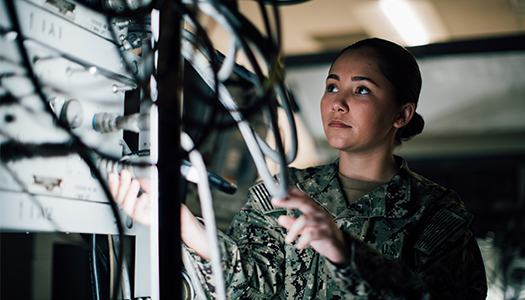- Home
- Career Overview
-
Looking
-
Applying
- College Overview
-
Planning
-
Applying
-
Paying
-
Attending
- Military Overview
-
Joining
-
Serving
INDUSTRY:
Engineering careers are just some of the in-demand STEM — or Science, Technology, Engineering and Mathematics — jobs that the Military offers today.
There are 16 military careers in this industry
Explore stories from service members who have Science, Technology, Engineering & Mathematics careers
Aerospace engineers direct research programs and design military aircraft and aerospace equipment. They serve as aviation technical specialists in air warfare research projects and supervise aircraft design projects from development to evaluation of experimental equipment. They formulate policies and coordinate procurement programs for aircraft and aircraft subsystems, and serve as engineering and technical management liaisons across military branches, contracting organizations, and other government agencies.
Biologists/biochemists perform and oversee analyses in chemistry, microbiology, immunology, and other areas related to the biomedical laboratory field. They direct and conduct laboratory procedures to detect, diagnose, treat, and prevent disease. They lead basic and applied health sciences research, and evaluate findings related to the effects of various stimuli, such as altitude and temperature changes, on physiological systems. They identify and investigate microorganisms and their effects on human health, and they develop control methods by designing vaccines and antitoxins.
Chemists conduct and advise on research having military and/or medical application, such as protection of personnel from chemical, biological, and radiological agents; development, handling, and use of improved petroleum and synthetic fuels and lubricants; and, purification and control of atmosphere, as on nuclear submarines. Chemists also perform experiments; devise instrumentation and techniques to record and collect test results; correlate and analyze data compiled in research; and, brief results.
Military data analysts conduct quantitative and qualitative analyses to support a wide variety of military activities, including acquisition, combat operations, system development, logistics, and force design. They use scientific and mathematical methods to collect, record, store, and analyze data. Data analysts may utilize artificial intelligence methods and/or apply algorithms to solve complex problems, conduct risk analyses, and run combat simulations.
Electrical and electronics engineers supervise and coordinate the research, design, development, testing, procurement, modification, and repair of electrical and electronics equipment. Their expertise includes radar, data systems, electronic warfare devices, and electronic components of missile weapons systems.
Geneticists are specialists who evaluate, diagnose, and treat genetic diseases. They accomplish this by interviewing patients and reviewing case and family histories. Geneticists in the Military provide counseling to patients with genetic diseases on the risks of recurrence. They also provide prenatal testing and advice regarding genetic conditions.
Geospatial imaging officers aid in the success of military operations by identifying and analyzing imagery and geospatial intelligence. They coordinate and supervise the collection, analysis, and processing of geospatial information. They oversee the use of geographic information systems (GIS) that store and analyze maps and other geographic data. These officers are also in charge of disseminating imagery and analysis results to relevant parties.
Historians research and document the past, focusing on military conflicts and their effects. Historians in the Military may teach, write books, serve in military history detachments, or act as advisors. They research, analyze, record, and interpret the past as recorded in a myriad of sources.
Industrial engineers perform research and development to determine the most effective ways for the Military to use its people and equipment. They conduct studies and oversee projects to optimize the use of time, money, materials, energy, and other resources. These professionals create engineering processes to improve the efficiency and productivity of military operations. They also apply analysis and assessment methods to problems related to strategic planning, acquisitions, and mission support. They build models and simulations to test existing and proposed systems.
Life scientists manage quality assurance programs and lead research related to human health protection. They study the effects of stimuli and other environmental factors on physiological processes, and the impact of microorganisms on human bodily functions and overall human health. They perform sanitation inspections to ensure military food safety, and provide consultation on issues regarding microbiological effects on subsistence. They assist in epidemiological investigations and direct training on food safety.